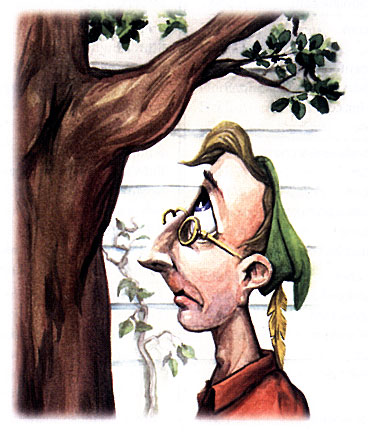|
"Cut
your own wood. It will warm you twice." -Henry David
Thoreau
I never dreamed of owning
a home; I dreamed of owning roses. Raised in apartments, I craved
land, not buildings. Our accountant's plea for more deductions
coupled with my in-laws' down-payment gift coerced me into joining
the gentry. "Squire Nelson," my brother joked, "master
of all he sees." He knows how nearsighted I am. My wife
and I had purchased the smallest house on the smallest lot on
our favorite hill. Its only arable land was a 10-foot strip of
setback between our living room and the street, 300 square feet
almost entirely shaded by a huge tree. The worst conditions for
a garden--death for the dream of roses. Stubbornly, I planted
them anyway. 'Voodoo'. 'Altissimo'. 'Peace'. I longed for Peace.
That gnarled old carob tree had shed her crunchy pods across
the land for 80 years before we bought her. Installed when Los
Angeles was a barren, low-desert wilderness, she was a rarity
in a city only cultivated in this century. A noble old girl,
she recalled the oaks and maples that had filled my northern
New Jersey childhood. The scant woods behind our first-ring-suburban
apartment afforded me countless hours of secret solitude and
fantasy. I played Robin Hood, King Arthur, and conjured the Brothers
Grimm. In each trunk lived the Lorax, and I, too, learned to
speak for the trees.
But she worried me, this carob, now that I owned  her.
One large limb extended precariously over my roof and, overall,
she looked pale and sickly. Dire predictions of El Niño,
the eleventh plague, brought nightmarish images of rain-soaked
boughs embedded violently in my attic. her.
One large limb extended precariously over my roof and, overall,
she looked pale and sickly. Dire predictions of El Niño,
the eleventh plague, brought nightmarish images of rain-soaked
boughs embedded violently in my attic.
So I summoned the Tree King, an arborist I found in the Yellow
Pages. The fanciful, Black Forest-ness of the name appealed to
me. The Tree King would come and all would be well.
The Tree King turned out to be a hairy little guy named Phil.
Glued to his hand was a cell phone/radio that allowed him to
receive calls and radio his office simultaneously, which he did
almost constantly throughout my audience, when he wasn't gesturing
and pointing with its antenna. True to his forest roots, Phil
drove a Gremlin.
He recited a catalog of ligneous afflictions--fire blight, gummosis,
two-horned woodborers, termites, ants--frightening contagions
that seemed to portend the imminent deforestation of the entire
neighborhood. He was a warm-hearted man and loved trees. Unprompted,
he spoke at great length of their transcendental qualities. But,
Phil concluded, for the good of the kingdom the old lady must
go. He roared off in a cloud of gremlin dust.
I agonized for days, torn between memories of my semi-sylvan
childhood and the responsibility to protect my grown-up home.
Ownership seemed an ailment in itself, eating away at the romance
of my youth. I sat for hours in the carob shade furiously channeling
passages by Joyce Kilmer, Cat Stevens, Dr. Seuss--anything to
stop me from calling the King. My spindly, bloomless roses frowned.
Squirrels stared.
It was nature versus nurture, but nature had no cell-phone.
They didn't cut her down so much as dismantle her. Chunk by chunk,
log by limb, the King's men power-tooled her to mulchable bits.
Determined to salvage something organic from this arborous destruction,
I requested that they split the logs for firewood. This, too,
was a massacre. Their hydraulic wedge simply squeezed until each
log exploded into hearth-sized pieces. There was no poetry in
this death.
But in the quiet that followed, nature rediscovered her miraculous
voice. The summer sun flooded our front yard, and my long-envisaged
roses exploded in a silent parade of color and scent. Liberated
from the carob's gloom, bulbs and grasses and vines burst to
life. Peace was at hand and our tiny yard became a festival.
We celebrated.
The hewn carob wood, left to season through the summer, burned
beautifully that winter, filling our home with its chocolaty
warmth. And come spring, we witnessed a resurrection. Nestled
in the decaying sawdust surrounding the stump, a volunteer sunflower
arose. Not a lone blossom, but a 10-foot-tall Sunflower Tree
with scores of blooms drinking in the warm rays of the sun. Passing
drivers stopped to take pictures. No one had ever seen anything
like it.
The old lady was reborn in effluence. Nature taught once again
of its humbling power. And somewhere in the yellow blossom's
brilliance, the Lorax had the last laugh.
|
